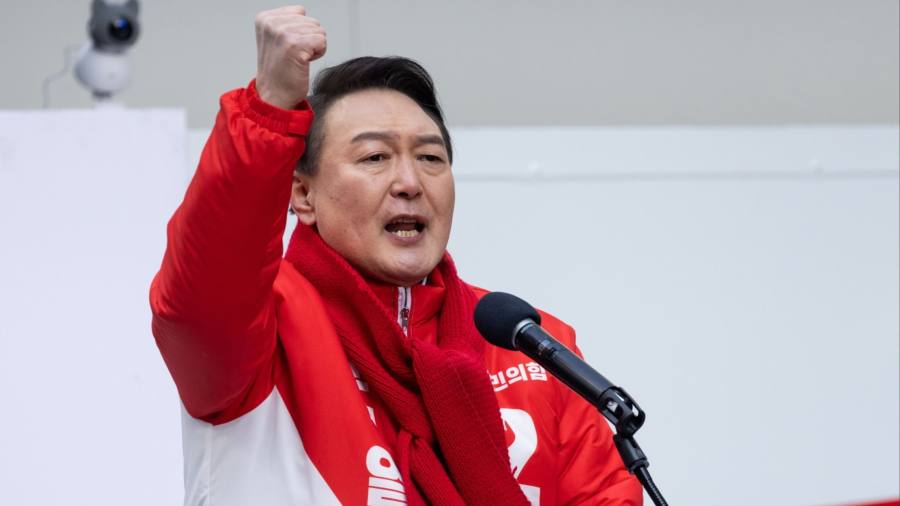Receive free Inside Business updates
We’ll send you a myFT Daily Digest email rounding up the latest Inside Business news every morning.
South Korean president Yoon Suk Yeol last week pardoned 12 business leaders convicted of offences ranging from misappropriation of company funds to embezzlement with the aim of “revitalising the domestic economy”.
The Korean ritual of pardoning convicted executives and politicians is long established. Last year, Yoon issued a pardon to Samsung princeling Lee Jae-yong, who served 19 months in prison for his role in a bribery scandal that also led to the imprisonment of former conservative president Park Geun-hye.
What makes Yoon’s pardons intriguing, however, is his own past as a hardman prosecutor famous for investigating corporate malfeasance. It was Yoon himself who oversaw the prosecution of both Lee and Park.
Yoon’s reputation as a fearless law enforcer — his trademark on the campaign trail was a theatrical upper cut gesture — helped carry him to the presidency last year. But it also struck fear into the hearts of Korean business leaders after past entanglements with Yoon and his former colleagues. “The Korean conglomerates are really scared of Yoon,” says one Seoul-based executive.
The complex relationship between Korean prosecutors and companies is rooted in the state-directed capitalism that underpinned the country’s development. Family-owned conglomerates known as “chaebol” enjoyed financial and political backing from the state. In return, they were expected to mobilise their resources in support of state objectives. Opaque laws and regulations, enforced by an elite cadre of politically conscious prosecutors, helped keep the conglomerates in line.
The irony, says Park Sangin, a professor of economics at Seoul National University, is that as president Yoon has so far proved to be a “typical pro-chaebol politician”. That has disappointed those who hoped Yoon’s record as a prosecutor meant he might challenge the cosy and sometimes corrupt relationship between government and big business.
However, there are more tensions in the relationship with so-called ownerless companies — formerly government-owned business that have been privatised and listed, but still subject to governance interference from successive administrations.
Young-jae Ryu, the founder of Seoul-based environmental, social and governance advisory firm SustInvest, notes the example of KT, a private telecoms company that has been without a permanent chief executive for a year after a candidate proposed by the company’s board was blocked by the National Pension Service, KT’s largest shareholder, which answers to the Korean government.
Last month, prosecutors raided 10 locations relating to KT’s acting CEO and two former CEOs, as part of an investigation into alleged preferential work contracts provided to one of KT’s subsidiaries. KT has reportedly denied the allegation.
The situation at KT has triggered concerns at another “ownerless” company that it could be next. According to a former board member of steel and battery materials producer Posco, the company’s leadership is worried the government is seeking a pretext to block the reappointment next year of chief executive Choi Jeong-woo, a company man under whose leadership Posco’s share price has more than tripled from 2020 lows.
The former Posco board member noted that unlike KT, the travails of which have garnered little international attention, an attempt by the Korean government to interfere in Posco’s governance would likely provoke an angry reaction from foreign investors, which own 40 per cent of the company.
Posco declined to comment. But a big foreign investor in Posco confirmed it was aware of and shared the leadership’s concerns, adding that government interference in listed Korean companies remains one of the principal reasons for the ongoing “discount” in Seoul-listed companies.
In a statement, South Korea’s presidential office said the Yoon administration remained “committed to its policy of protecting the rights and interests of minority shareholders and establishing a fair and transparent corporate governance system”. “The government should not and cannot intervene in the management or corporate governance of a business in which it is not a shareholder,” read the statement.
Whatever the government’s intentions, it remains the case that the commanding heights of Korean industry remain populated by a large number of executives with past convictions, even if they were subsequently pardoned. If legitimately convicted, that is not a good look for Korea Inc. If not legitimately convicted, neither Korean citizens nor foreign investors can be said to fully enjoy the protection of the rule of law.
Read the full article here




